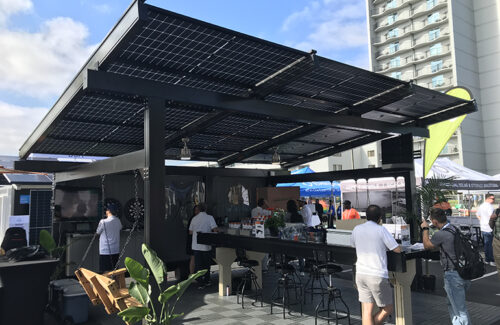The size and aesthetic of solar carports and canopies are changing thanks to demand for these products in the residential market. An influx of new manufacturers producing solar canopies have scaled these structures to fit within the confines of residential properties and designed them to look closer to a pergola than the towering carports covering parking lots and garages.

Infinity Rack manufactures solar canopies for residential and commercial applications. Infinity Rack
While they certainly cost more than installing a solar array of a similar size on a rooftop, these solar canopies boast functionality beyond energy generation. They are relatively simple to construct and offer overhead cover from precipitation for vehicles or people beneath them.
“The big advantage is the secondary use for it. I think the industry underestimates how much people want solar, but they just don’t want to put in on their roof,” said Aleksandr Bernhard, CEO of Pavilion Solar, a Florida-based PV canopy manufacturer.
Solar carports have already offered integration with accessories like EV chargers and overhead lighting. Residential solar canopies are expanding that to include items found in a backyard pergola, like fans, TVs, weatherproofing canvas and even walls to enclose the space.
These canopies straddle the line between boutique product and practical solar solution. Pavilion Solar just hit the scene in 2024 with EnPod, a solar carport/canopy that is certified to function in high-velocity hurricane zones. While a product like EnPod can withstand wind speeds of 175 mph, the structure is also inspired by Italian and Northern European design sensibilities and is meant to blend naturally in a residential yard.
Manufacturers are now focusing on aesthetic design and offering more than a factory finish for their carport and canopy structures.
Among the five residential winners of Solar Power World’s 2024 Top Products competition, two are solar canopy manufacturers: Infinity Rack and Lumos Solar. Both produce canopies with residential spaces in mind. Then there are companies like Brooklyn Solar Canopy Co. that make them for rooftops on city buildings.
The residential solar canopy market is still expanding. Bernhard said he started Pavilion Solar because he couldn’t find a solar canopy that could withstand the weather demands of his Florida home. But since making a canopy for himself, he’s found there’s enough demand for even this specific type of solar canopy to warrant mass production.
“We get all of our insights from solar installers, because those are our partners,” Bernhard said. “What we’re seeing from them is they have a growing amount of people asking for carports and pergolas and cabanas around pools. I don’t know why that is, but I do know that solar installers, universally, are saying they’re getting more requests for this kind of product.”
As interest increases, perhaps someday soon the solar canopy will be as ubiquitous as the backyard patio or carport garage.


















